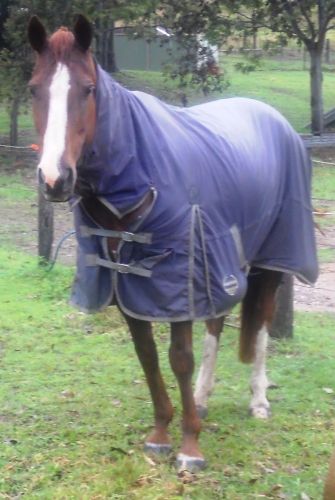Horsezone News
DPI Warns Queensland Horse Owners - Be Prepared for More Bad Weather

Animal Biosecurity and Welfare project leader Warren Lehmann said heavy rain was expected along the coast in the coming days from Cairns down to Gladstone and also in the south east of the state.
"Central Queensland and the Dalby area have recently experienced heavy rain and flooding, and it looks like there is more on the way over the Christmas weekend," he said, "Owners of horses and livestock need to be ready in the event that they have to take urgent action. People need to be extra vigilant when handling their animals at this time as they can become jittery before a storm and are more easily upset and spooked."
Tips for horse and livestock owners in preparation for a severe weather event:
- If there is time, move animals to safer grounds before any high winds set in.
- Ensure livestock bears some form of identification, such as a brand, so they can be identified and returned should they become displaced.
- Ensure that stock registers are up to date and kept in a safe place.
- Move stock to a safe area before leaving your property for any length of time. Check with your local council and other relevant agencies about emergency animal shelters and yards.
Mr Lehmann said if a cyclone or severe storm was approaching, animals should be moved under solid cover if possible.
"Secure any loose objects on the farm as they can become flying missiles in high winds so ensure the area is clear of clutter, particularly where animals are kept," he said, "In extreme circumstances on farms, you may have to consider opening gates or cutting fences so stock can escape danger and be collected later. In the event of a flood, either move your horses and livestock to high ground or ensure they have easy access to high ground. Producers are advised to mark gates and water locations on maps of their properties if someone has to move stock for them."
Mr Lehmann said pets should also be included in household or farm emergency plans.
"Ensure your pets are properly identified by name tags and keep emergency phone numbers handy for your vet, local animal welfare agency and pet information and advisory services," he said.
"Plan to have enough food, water and medical needs for your pets. It may be safer to leave your pet at home in a safe place than to take it with you. Remember most evacuation centres don´t take pets so plan to leave them at home."
For more information on managing animals in disasters, contact Biosecurity Queensland on 13 25 23, the RSPCA, your local Council or your veterinarian.
story: www.dpi.qld.gov.au
News Search
Categories
- General
- Event Results
- Stallionzone
- Sponsored Shows
- Clubs
- Health
- Feature Horses
- Competitions
- Five Minutes With Horsezone
- Young Riders
- Reviews
- Training and Clinics
- Postcards from the saddle
- 2014 Equitana by HORSE FIRST
- 2013 Equitana
- 2012 Equitana
- 2012 London
- 2011 Equitana
- 2011 Queensland Floods
- 2010 WEG
